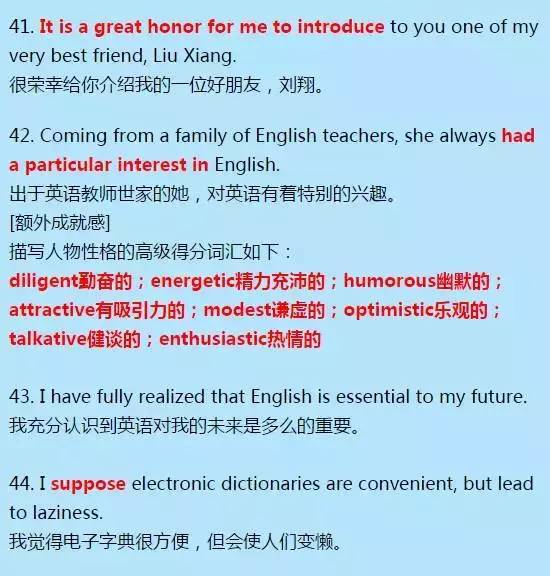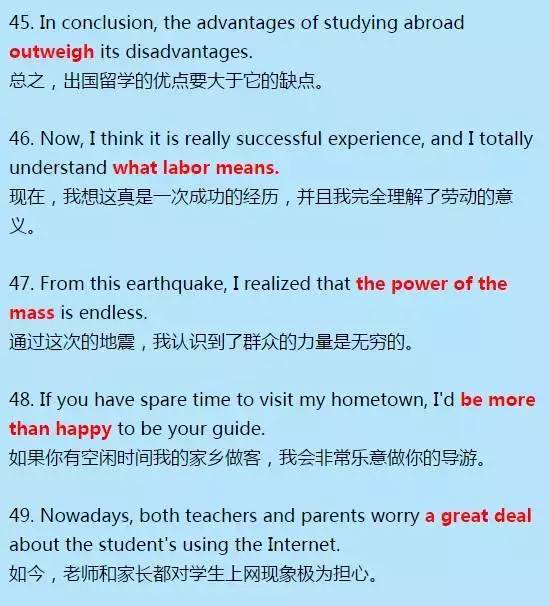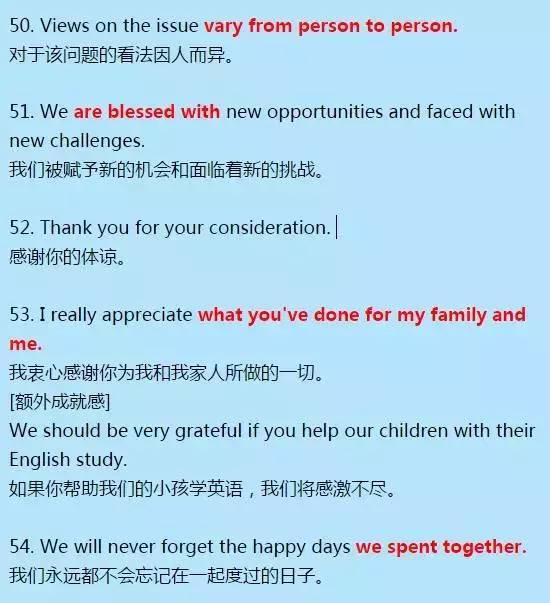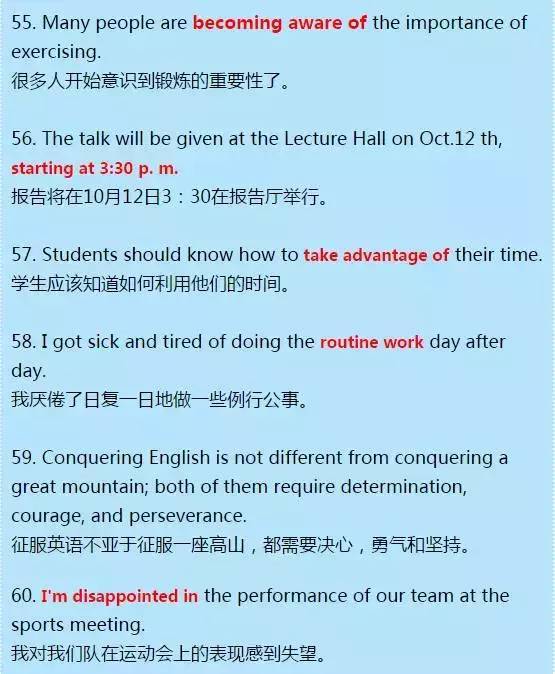| 教育经
| 教育经
在英语写作中,我们经常用汉语直译而忽略地道的英语表达,这往往造成得分低的结果。怎样做到表达地道呢,多掌握一些句型不失为很好的办法,背熟下面99个黄金写作句型,2018高考英语写作必将无限接近满分,快快行动起来吧!
下面这些句子,既有地道的英语表达示例,也有高考英语中常见的长难句型。小编已经为同学们用彩色标出并且加粗,这样大家在看的时候就会一目了然,便于记忆!
英语习作中的地道英式表达
1. It is important for everyone to learnEnglish well in our rapidly developing world.
在这个迅速发展的世界里,对每个人来说学好英语都是非常重要的。
[额外成就感]
同样句型包括:It is important/necessary/difficult/convenient/possible for sb. to do sth.
例句:It is necessary to shake hands when you first meet someone.
与第一次见面的人握手是非常必要的。
2.The harderyou work at it, the more progressyou will make.
你工作越努力,你取得的进步就越大。
[额外成就感]
①The+比较级..., the+比较级...
②比较级+and+比较级(The world is getting smaller and smaller.)
3. If everyone makes a contribution to protecting the environment, the world will become much more beautiful.
如果每个人都为保护环境做出贡献,世界会变得更加美好。
[额外成就感]
类似的句型还有:If necessary…, they can…
4. The best way to remember new wordsis to practice them everyday.
记忆新单词最好的方法是每天操练这些单词。
5. The atmosphere in my family is fantastic.
我的家庭气氛温馨和睦。
6. The reason why people choose to live in the cityis that the life is more convenient and colorful.
人们为什么选择生活在城市的原因是因为城市的生活更方便、更丰富多彩。
7. I had a great first impression of American people.
我对美国人民有了很好的第一印象。
8. We have lots of confidence inour ability to solve any problem.
我们对自己解决问题的能力有足够的信心。
9. With the rapid development of modern technology, the Internet has become a necessary part of our daily life and work.
随着现代科技的迅速发展,互联网已经成为我们生活和工作中必不可少的一部分。
10. You should read as many books as you possibly can.
你应该尽可能的多读书。
11.China is becoming more and more prosperous because of the reform and “opening up” policy.
由于实施了改革开放政策,中国变得更加繁荣了。
12. We all need clean air to breathe; we all need clean water to drink; we all need green places to enjoy.
我们都需要呼吸清新的空气,我们都需要饮用洁净的水,我们都需要享受绿地。
13. Let's work together to make our world a better place.
让我们一起努力把世界变得更加美好。
14. We should make full use of our timeto do useful and productive things.
我们应该充分利用好时间去做有用的、富有成效的事。
15. We should get into the good habit of using our time wisely.
我们应该养成明智利用时间的好习惯。
16. What I really want to know is whether he will go abroad next month?
我的确想知道的是,他是否会在下个月出国。
17. Televisionis harmful to developing minds.
电视不利于开发心智。
18. Children usually have far more potential thantheir parents have realized.
孩子们都有很大的潜能,而父母却没有意识到这一点。
19. In the past 10 years, great changes havetaken placein our school.
在过去的10年里,我们学校发生了巨大的变化。
20. People who spend more time with their familiesare usually healthier and happier.
那些花更多时间和家人在一起的人通常会更健康更幸福。
21. The job was hard, whichmade me sotired thatI almost quit half way.
这份工作太辛苦,差点使我半途而废。
[额外成就感]
①直接使用:so… that…
例句:The job was so tired, boring and seemed endless that I almost quit half way.
这份工作太累、太无聊,而且没完没了,这使我差点半途而废。
高级句型挑战:
The job was hard, boring and seemed endless, which made me so tired that I almost quit half way.
这份工作太辛苦、太无聊,而且没完没了,这使我非常累,差点半途而废。
②能够增加句子层次的高级连词还有:
(Not only …but also…)、(Because…)、(because of…)、(As long as…)、(so long as…)
22. The Red Star Television Factory, which produces TV sets of quality, was set up in the 1980's.
生产高品质电视的红星电视机厂,始建于1980年。
23. The E-reading room, where we can send e-mails to all parts of the world, is open to both teachers and students.
电子阅览室对老师和同学都同样开放,在那里我们可以向世界每个地方发送电子邮件。
24. I feel I will be fit forthe job needed in your company.
我感觉我会是你们公司所需要的人。
25. The number of workers and engineers has risen toover 2000, and 80% of them are college graduates.
工人和工程师的数量已超过了2000人,而且他们有80%都是大学学历。
26. There is an increasing tendency that students own their mobile phones on campus.
在校园内,学生拥有手机的趋势在不断增长。
27. Now in the rural areas, there are many children out of school. I think one of reasons is that their families are too poor to afford their schooling.
现今,在农村地区有很多孩子失学。我认为原因之一就是他们的家庭太贫困,以至于无法供应他们上学。
28. People should pay more attention tothe education of children because they will play a very significant /important part/role in the future of our country.
人们应该增加对儿童教育的重视,因为他们会在祖国的未来扮演重要的角色。
29. In 2008, you will see Beijing as beautiful as a garden, with cleaner water and clearer sky.
到2008年,我们会看到北京像花园一样,有着更加清澈的河水和更加碧透的天空。
30. How nice to hear from you again.
能再次收到你的来信真是太好了。
31. Your early reply will be highly appreciated.
敬盼早日回复。
[额外成就感]
I'm looking forward tomeeting you in no time.
我期待与你早日相见。
32. If you have any questions or requests, please let me know.
如果你有什么问题和请求只管跟我说。
33.No matter what you do in the future, English will always be important.
不管你将来做什么,英语都是很重要的。
34. Nothing is more important thanto receive education.
没有什么比接受教育更重要的事了。
35. There is no doubt that playing video game is going to be their biggest problem for students to affect study.
毫无疑问,玩电子游戏正在成为影响学生学习的最大问题。
36. Obviously, it is high/about time that we tooksome effective measures to solve the problem.
显然,是采取一些积极的措施来解决问题的时候了。
[额外成就感]
写作高手使用的高难度表达:
I suggest the department concerned taking some effective measures to improve the present situation.
我建议有关部门采取一些有效措施改善现状。
37. Since he went to senior high school, he has worked very hard.
自从他上高中以来一直很用功。
38. We should spare no effort to beautifyour environment.
我们应该不遗余力的美化我们的环境。
39. Smoking has a great influence onour health.
吸烟对我们的健康有很大的影响。
40. As a proverb says, /As is well known to us, storms make trees take deeper roots.
正如一句名言所说,风暴使树木深深扎根。




高考英语阅读理解重难点句型
句型61
would rather that somebody did…"宁愿……;更愿意……"(表示现在或将来的不能实现的愿望)
would rather that somebody had done…"宁愿……;更愿意……"(表示过去的不能实现的愿望)
[例句]
1.I'd rather you posted the letter right now. 我想让你现在去寄信。
2.I'd rather you were not a celebrated actor. In that case, we could spend more time together.
我到情愿你不是个知名演员,这样我们可以有更多的时间在一起。
3.I'd rather that I hadn't seen her yesterday.
我情愿昨天没有看到她。
句型62
as if/though+主语+did/had done…好像……(表示与现在或将来的情况相反用过去时;表示与过去的情况相反用过去完成时)
[例句]
1.Our head teacher treats us as if we were her own children, so all the students in our class think highly of her.
我们校长对待我们就像我们是她自己的孩子一样,所以我们班所有学生都很尊重她。
2.Alan talked about Rome as if he had been there.
Alan谈起罗马来就好像他去过那里似的。
句型63
"wish +宾语从句",表示不大 可能实现的愿望
表示现在的不能实现的愿望:主语+过去时;
表示过去的不能实现的愿望:主语+had done;
表示将来的不能实现的愿望:主语+would/could do
[例句]
1.How I wish we students had more free time to relax ourselves! 我们学生多么希望有更多的自由时间放松自己!
2.I failed in the maths exam. How I wish I hadn't wasted so much time playing!
我考试没有及格。我多么希望我没有浪费这么多的时间用来玩儿!
3.What a pity you can't go to the party. How I wish I could dance with you at the party!
真遗憾你不能去这个聚会。我多么希望我可以和你在聚会上跳舞啊!
句型64
It's high/about time that somebody did (should do) (should通常不省略) …早就该……
[例句]
1.It's time that you went to school.= It's time that you should go to school.
你该去上学了。
2.It's high time that we did something to improve our environment. 该是我们为环保做些事情的时候了。
3.I think it's high time that she made up her mind. 我想她该拿定主意了。
句型65
情态动词+动词不定式完成结构的用法
could have done "本来可以做某事实际却没做”或“可能已经做了某事”
might have done "或许已经做了某事“
should/ought to have done "本来该做某事而实际未做”
should not/ought not to have done "本来不该做实际却做过了,含有责备语气“
needn't have done "本来不必做但是已经做过了
would rather have done "当时宁愿做了某事实际没有做过悔"之意。
句型66
as, though, although引导的让步状语从句。
[注意]although位于句首;though位于句首或句中;as位于句中=though。它的词序是把句中强调的形容词、副词、动词或名词放在连词前。
[例句]
1. Although/Though I'm young, I already know what career I want to follow.
→Young as/though I am, I already know what career I want to follow.
我虽然年轻,但我已经明白我应该追随什么样的事业。
2. Although/Though I respect him very much, I cannot agree with his idea.
→Much as/though I respect him, I cannot agree with his idea. 虽然我很尊重他,但是我不同意他的观点。
3. Although/Though he is a child, he knows a lot of Chinese characters.
→Child(省略冠词)as/though he is, he knows a lot of Chinese characters. 他虽然还是个孩子,却认识了许多汉字。
4. Although he tried, he couldn't solve the problem.
→Try as he might, he couldn't solve the problem. 尽管他努力了,但是他没有解决问题。
5. Although it is raining, I'm going out for a walk.
→Raining as it is, I'm going out for a walk. 天虽然在下雨,我还是要出去散步。
6. Strange as it may seem, nobody was injured in the accident. 这次意外虽然显得不可思议,却没有人受伤。
7. Much as I would like to help, I have a lot to do. 虽然我很想帮助你,但是我有很多事要做。
8. Object as you may, I will go. 纵使你反对,我也要去。
句型67
…before…特殊用法(1)"没来得及……就……"
[例句]
1.The roof had fallen before he had time to dash into the room to save his baby.
他还没有来得及冲进房间救孩子,房顶就塌了。
2.He had run off before I could stop him. 我还没有来得及阻止,他已经跑了。
3.To my great disappointment, my favorite singer had left the concert before I could have a word with her.
让我非常失望的是,我还没有来得及和我最喜欢的歌手打招呼,她就已经离开了。
句型68
…before…特殊用法(2)"过了多久才……"或"动作进行到什么程度才……"
[例句]
1.They had walked about fifty miles to the west before they saw a village.
他们西行50英里才看到一个村庄。
2.The workers had worked day and night about three days before everything returned to normal.
工人们连续工作3天才使一切恢复正常。
3.He almost had knocked me down before he knew it.
他几乎撞到我了才意识到。
4.We had walked a long way before we found some water.
我们走了很长的路才找到一点水。
5.Five years went by before I knew it. 不知不觉,五年过去了。
句型69
It was + 时间段+before…."过了多久才……"
It was not long before…."不久,就……"
It will (not) be +时间段+before…."要过多久(不久)……才……"(before从句谓语动词要用一般时态)
[例句]
1.It was not long before he sensed the danger of the position.不久他就意识到他处境的危险。
2.It was five days before he came back. 五天后他才回来。
3.It will be half a year before you graduate from the school. 再过半年你才能毕业。
4.It will not be long before they understand each other. 他们大概不久就会互相了解。
句型70
in case of…(+n.) "以防;假使";
in case that…"以防,假使……"(谓语动词用一般现在时态或should+动词原形)
[例句]
1.In case of fire, what should we do?
假使发生火灾,我们要做些什么呢?
2.Please remind me about it in case I forget/should forget. 请提醒我,以防我忘记。
3.In case (that) John comes/should come, please tell him to wait.
假使约翰来了,请让他等一会儿。
4.Please take your umbrella in case (that it rains/should rain).带上雨伞,以防下雨。
句型71
强调句型基本构成:It is/was + 被强调的部分 + who(强调部分指人时)/that (强调部分可以是人也可以是事物)+ 原句剩余部分
[例句1]
I saw him in the street yesterday afternoon.
→It was I who saw him in the street yesterday afternoon.(强调主语)
→It was in the street that I saw him yesterday afternoon.(强调地点状语)
→It was yesterday afternoon that I saw him in the street.(强调时间状语)
→It was him that/who I saw in the street yesterday afternoon.(强调宾语)
[例句2]
He didn't go to bed until his mother came back.
→It was not until his mother came back that he went to bed.
句型72
(1)、祈使句(表条件)+ or/or else/ otherwise + 主句
(2)、祈使句(表条件)+ and +主句(表结果)
[例句1]
Hurry up, or you'll be late for class.
快点儿,否则你上课要迟到了。
[例句2]
Work hard and you will make progress every day.
好好学习,天天向上。
句型73
…until…."直到……时候"
not…until…"直到……才……"
[例句1]
You are to stay until your mother comes back.
你得等到你妈妈回来。
The meeting was put off until ten o'clock.
会议推迟到十点钟。
[例句2]
The villagers didn't realize how serious the pollution was until all the fish died in the river.
→Not until all the fish died in the river did the villagers realize how serious the pollution was.
等到湖里的鱼全死光了,村民们才意识到污染是多么严重。
句型74
unless…"除非,如果不……"(=if…not)
[例句]
I shall go tomorrow unless it rains.
如果不下雨,我明天去。
I won't attend his birthday party unless invited (=unless I am invited).
除非被邀请,否则我不去参加的生日晚会。
句型75
(1)、主语 + was/were doing… when…"正在做某事这时……"
(2)、主语 + was/were about to do…when…=主语+was/were on the point of (doing)…when…"正要去做某事这时……"
(3)、主语 + had done… when…"刚刚做完某事这时..."
[例句1]
I was walking along the river when I heard a drowning boy cry for help.
我正在河边行走,这时我突然听到一个落水男孩求救。
[例句2]
I was about to leave when it began to rain.
我刚要离开,这时下雨了。
[例句3]
I had just finished my exam paper when the bell rang, announcing the class was over.
我刚做完试卷下课就铃响了。
句型76
while:"当/在……时候","尽管"、"虽然","然而;可是"
[例句1]
While I admit that the problem is difficult, I don't think that they can't be solved.
尽管我承认这个问题很难,但是我并不认为无法解决。
[例句2]
I earn only 120 dollars a week, while she earns 180 dollars. 我一星期只赚120美元,她却赚180美元。
句型77
where:可以引导地点状语从句、定语从句和名词性从句。
[例句1]
Where there is a will, there is a way. (地点状语从句)
有志者,事竟成。
[例句2]
That is the building where my father works. (定语从句)
那是我父亲工作的大楼。
[例句3]
We could see the runners very well from where we stood.(宾语从句)
从我们所站的地方能很清楚地看到赛跑的选手。
句型78
what:引导名词性从句,在句子里可以充当主语、宾语、表语、定语。
[例句1]
What is most important in life isn't money. (主语从句)
人生最重要的并非是金钱。
[例句2]
Will you show me what you bought? (宾语从句)
可以把你所买的东西给我看一下吗?
[例句3]
Mary is no longer what she was ten years ago. (表语从句)
Mary已经不是10年前的她了。
句型79
as引导的非限制性定语从句
[注意1]as通常只指整个句子的内容,不表示部分内容。
[注意2]as引导的非限制性定语从句通常指"事先可以预料到的","料想到的",表达"好"的方面。
[例句]
This is also part of your work, as I told you before. 我曾告诉过你,这也是你工作的一部分。
The man was a teacher, as was evident from his way of speaking. 从那人说话的样子可明显看出,他是个老师。
句型80
which引导的非限制性定语从句
which引导的非限制性定语从句既可以指整个句子内容,也可以指句子的部分内容(如单词或词组等)。
[例句]
Yellowstone National Park, which is in Wyoming, is one of the most beautiful national parks in the world.
黄石国家公园位于怀俄明州,是世界上最美丽的国家公园之一。
She changed her mind again, which made us all angry. 她又改变了主意,这使我们大家都生气了。
句型81
疑问词+ever (whatever, whoever, whichever, whomever,whenever, wherever,however):既可以引导名词性从句,也可以引导让步状语从句。
[例句]
We will do whatever we can to help him out. (宾语从句)
我们要尽力帮助他摆脱困境。
Whatever (=No matter what) may happen, we shall not lose hope.(让步状语从句)
无论发生什么事,我们都不能失去希望。
[注意]:“No matter+疑问词”只能引导让步状语从句。
句型82
完全倒装句型(1)
here, there, out, in, up, down, now, then, away等副词放在句首,句子需要全部倒装
[例句]
There goes the bell! = The bell is ringing. 铃响了!
Here comes the bus. =The bus is coming. 汽车来了。
Then came the hour we had been looking forward to.
我们期盼的时候到了。
句型83
完全倒装句型(2)
表示方位的介词短语放在句首,句子完全倒装,此时谓语动词多为be, lie, stand, sit, come, walk, run, stop etc. 不及物动词。
[例句]
On a hill in front of them stands a great castle.
在他们面前的山上矗立着一座巨大的城堡。
In front of the house stopped a police car.
房子的全面停着一辆警车。
Under the tree sat a boy of about ten.
在树下坐着一个大约10岁的男孩。
句型84
部分倒装句型(1)
否定意义的副词或短语放在句首,句子半倒装。
主要有:little, seldom, hardly, rarely, scarcely, never, not at all, by no means(决不), at no time(在任何时候都不),nowhere, in no case (无论如何都不);not in the least (=not at all) , on no condition(决不) 等。
[例句]
Never shall I forget you.
我绝不会忘记你。
At no time was the man aware of what was happening.
那个人根本没有注意到发生的情况。
Little did I understand what he said to me at that time.
我那时几乎没有明白他给我说的话。
Not a single mistake did he make in the exam.
他在考试中没有犯一个错误。
句型85
部分倒装句型(2)
only + 状语(副词/介词短语/状语从句)
[例句1]
Only then did I realize the importance of English.
那个时候我才意识到英语的重要性。
[例句2]
Only in this way can you speak English well.
只有用这种方式你才能说好英语。
[例句3]
Only when I got to know him, did I know I had been wrong before.
只有当我开始了解他的时候,我才知道我之前一直都错了。
句型86
部分倒装
not only…, but also…(前一分句倒装,后一分句不倒装)
[例句]
Not only should we students study hard, we also should know how to enjoy ourselves in our spare time.
我们学生不仅要学习好,还应该知道在课余时间怎样享受生活。
句型87
部分倒装
neither... nor... 既不......也不......
[例句]
Neither was the price satisfactory, nor did the color agree with me.
价格不能令人满意,颜色也不太适合我。
句型88
部分倒装
"only + 状语"放在句首,句子半倒装
[例句]
Only when the war was over did he return to work.
直到战争结束他才回去工作。
Only by changing the way we live will we be able to save the earth.
只有改变生活方式,我们才能拯救地球。
[注意]这种结构的倒装只在only引导状语的时候使用,only引导主语的时候不用倒装。例如:
Only in this way can you work out the problem. 你只有用这种方法才能做出题目。
Only this way can help you work out the problem. 只有这种方法才能帮你做出题目。
句型89
部分倒装
so + be动词/助动词/情态动词等 + 主语 "……也……"(表示肯定意思)
[例句]
In the past 20 years, our society has changed a lot, so have our eating habits.
近20年来。我们的社会发生了很大的变化,我们的饮食习惯也变了。
[注意1] "so + 主语 + 助动词" 表示肯定已有的观点或事实
I promised to help him, and so I did.(我确实帮助他了)
[注意2] "主语 + 助动词 + so" 表示按照别人的要求去做。
The doctor asked Charlie to breathe deeply and he did so.
医生让查理深呼吸,他照做了。
句型90
so it is with somebody = it's the same with somebody前者怎么样,后者也怎么样
[注意]前面既有否定句又有肯定句,或有多个谓语动词或助动词难以选择时,用此句型。
[例句]
John likes English but he doesn't like maths, so it is with me (so it is the same with me).
约翰喜欢英语但不喜欢数学,我也是这样。
Tom is a student and he studies hard, so it is with me(so it is the same with me).
汤姆是个学生,他曾经学习很努力,我也是这样。
句型91
(从句)If + were/did(动词的过去式),(主句)主语 + would/might/should/could + do(表示对现在情况的假设)
[例句]
If I were you, I would not be so proud.
如果我是你,我不会如此自负。
If I were in your position, I would think better of it.
如果我处在你的位置,我会好好考虑它。
句型92
(从句)If + had done, (主句)主语+ would/might/should/could +have done(表示对过去或已经发生事情的虚拟假设)
[例句]
What a pity it is that you didn't attend the concert yesterday! If you had attended the concert, you would have seen the famous singer.
真遗憾昨天你没有去听音乐会。如果你去了,就能见到那位著名歌手。
句型93
(从句)If + were/did(动词过去式)/were to do/should do,(主句)主语+ would/might/should/could + do(表示对将来的假设)
[例句]
If he should refuse (= If he were to refuse=If he refused), it didn't matter at all.
万一他拒绝了,那也没关系。
句型94
虚拟语气条件句的倒装
在虚拟条件句中,如果出现有were, had, should,可以省去if, 把这些词放在句子前面,构成虚拟倒装句。
[例句]
Should he act like that again, he would be fined.
如果他还这样做,就要受罚。
Had the doctor come in time last night (=If the doctor had come in time last time), the boy would have been saved.
昨天晚上要是医生及时到达,小孩就会得救。
Were I to go to the moon one day, I would see it with my own eyes.
如果有一天我到了月球,我就能亲眼看到它了。
句型95
if only引起的感叹句,相当于 "How I wish + 宾语从句",意思是"但愿……;要是……就好了"
[例句]
If only he could come!
他要是能来就好了!
If only I hadn't been so careless in the exam!
我当时没有那么粗心就好了!
句型96
if it were not for… (= were it not for…)
if it hadn't been for… (= had it not been for…)"要不是因为有……;如果不是……"
[例句]
If it hadn't been for (= Had it not been for) the determined captain, all the passengers on board wouldn't have been saved.
要不是船长一直坚强,船上的旅客就不会得救。
If it were not for your rich parents, you couldn't live so easy a life.
要不是你父母有钱,你的生活不会如此安逸。
句型97
"but for + 名词"和"but that +从句",意思是"倘若不是;要不是",接虚拟语气
[例句]
But for air and water, nothing could live. (= If there were no air or water, nothing could live.)
如果没有空气和水,什么东西都难以生存。
But for the storm, we should have arrived earlier.
= (If it hadn't been for the storm, we should have arrived earlier.)
如果不是暴风雨,我们早就到了。
句型98
在动词insist(1坚持做某事),order, command(2命令), advise, suggest, propose(3建议做某事),demand, require, request, ask(4要求)等表示建议、命令、要求的名词性从句中谓语动词要用虚拟语气。
基本句型:主语+ (should) + 动词原形。
另外像decide, desire, intend, recommend等也要接(should)+动词原形结构。
[例句]
Mother insists that Tom (should) go to bed at nine o'clock.
妈妈坚持汤姆九点上床睡觉。
That is their demand that their wages (should) be increased.
他们强烈要求增加工资。
句型99
It's strange(that) … (should) do表示"竟然"
[例句]
It's strange that he shouldn't pass the exam. 奇怪的是他竟然没有通过考试。